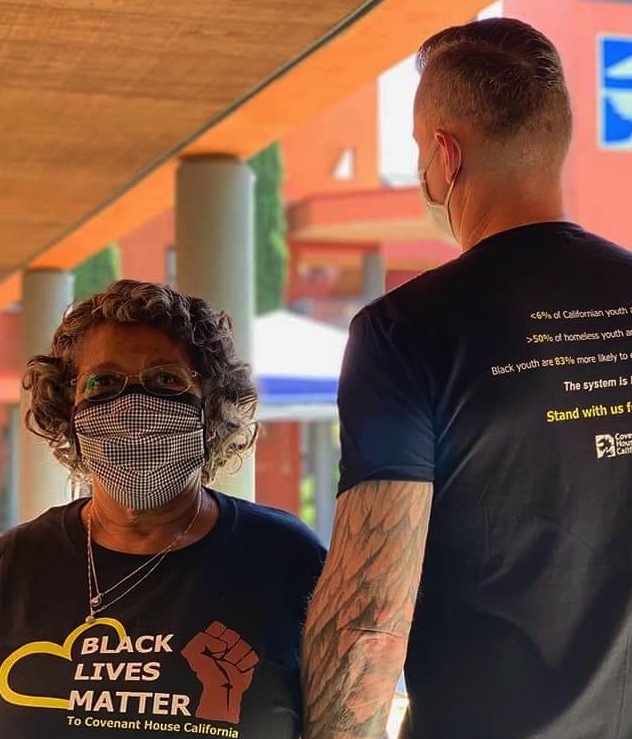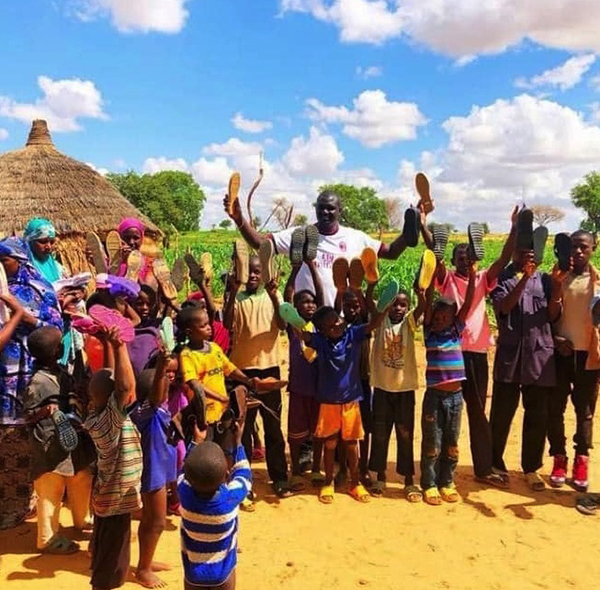By Darlene Donloe
Contributing Writer
Since 1998, Covenant House has been a nonprofit youth homeless shelter that provides sanctuary and support for homeless and trafficked youth, ages 18-24.
The organization believes that no young person deserves to be homeless; that every young person in California deserves shelter, food, clothing, education … and most importantly, to be loved.
Covenant House, which serves more than 4,700 youth a year, provides a full continuum of services to meet the physical, emotional, educational, vocational and spiritual well-being of young people, in order to provide them with the best chance for independence.
Statistics show that about one-third of the country’s youth experiencing homelessness live in Los Angeles, with nearly 12,000 homeless youth in California.
Since COVID-19 hit last spring, Covenant House has continued to support youth, but, like other organizations, had to pivot its efforts.
Lon Usher, 72, has been with Covenant House for 30 years. She knows better than anybody about the changes the organization has had to make.
“One of the things I loved to do was to interact with the kids on a daily basis,” said Usher, an alumni coordinator. “I’m a hugger. Now I can’t give hugs. We need to social distance. Now they can’t pile into my office to have family-like conversations. I can’t teach them how to cook in person, which is something I’ve been doing for years.”
Anthony Conley, 35, has been the community involvement coordinator at Covenant House for two years. He, too, has had to make adjustments.
“COVID-19 has really changed a lot of what I do,” Conley said. “Part of my job is to get volunteers, but I can’t do it now. We used to have a number of volunteers bringing in their expertise. We can’t accept donations. We have been able to continue to take new clothes, but not used clothes even if they are in good condition.”
People have preconceived notions about people who are homeless. The people at Covenant House have no problem setting the record straight.
The people who work at Covenant House are quick to tell you that the youth they deal with are not homeless and they’d prefer it if they weren’t referred to that way.
“They are youth experiencing homelessness, instead of homeless youth,” said Michael Stommel, who handles communications for the organization. “Homelessness looks different to different people. Some youth who have been living off of friends and family members are still homeless. Favors run out and they have no place to go. Some are ostracized by family members.”
“I’ve learned that we need to change our way of thinking about young people,” Usher said. “We need to go back to the way it was when I was growing up. It takes a village to raise a kid. They deserve love. I’m a mother and a great-grandmother. I wake up looking forward to going to work to help someone. I never know what I’m going to have to do. It keeps me young.”
“Once they are here, they are no longer homeless,” said Conley, who knew in his heart that working with youth was what he wanted to do. “About 50% of the youth who come to us have aged out of foster care. It really affects that population. But we want to stress that they are just like us. There seems to be a stigma that they are different, just because they may not have a support system to keep them afloat.”
“People also assume that just because someone is 18-24, they are grown,” Usher said. “At that age, they haven’t really fully developed. Their mindset is such that they still need us to guide them.”
In 2019, Covenant House boasted 240,033 meals served to youth, 8,923 contacts by the Street Outreach Team, and 2,226 young people receiving or being connected with medical services.
Youth who arrive at Covenant House are 40% LBGTQ, 40% have aged out of foster care, 83% are Black, some come as a result of domestic violence, and some are born into homelessness.
“Every story is so different,” Usher said.
Covenant House supportive services include street outreach, day outreach, drop-in center, medical and mental health, career services, education services and spiritual ministry.
When someone arrives at Covenant House, they are immediately met with the basic needs through a nourishing meal, a shower, clean clothes, medical attention and a safe place to sleep.
“It’s not that hard to help people,” said Conley, a married father of one. “Initially, when I first got here, I felt the community didn’t want to give back. But I found out that there are a lot of people compassionate about this issue. Just come sit down and talk to folks.”
Conley said some people want to push it into another neighborhood.
“It’s the ‘not in my backyard’ mentality,” he said. “Education is the key — and activism. These young people want to dream big. The community needs to embrace that. Sometimes it’s as simple as a conversation and getting to know them on a personal level.”
Covenant House, an affiliate of Covenant House International, provides a safe haven from the difficulties of homelessness where youth —regardless of life experience or identity — are served without judgment.
The street outreach team goes out five days a week to homeless encampments. The point is to build trust.
“The street outreach team has been amazing,” said Conley, who grew up in Inglewood. “It’s important to build trust so they really understand you’re trying to help them get off the street — and that you’re not trying to harm them.
“We provide them with hygiene kits, clothes and food. When it comes to human trafficking, they have been groomed not to trust people — only to trust their pimp. Some of our kids have had a lot of trauma.”
Conley said Covenant House, which can always use donations, is in need of more beds in Los Angeles.
“Our waitlist can be two or three months,” he said. “Sometimes it’s longer for men because there are fewer men’s resources. Unfortunately, there is a limited amount of beds in Los Angeles.”
Once someone has been welcomed into Covenant House, there are several housing opportunities for which they could qualify. Each night there are about 100 youth occupying beds on campus.
There are 64 residents in the safe haven program, which allows the residents to stay from one to 90 days.
The rights of passage program has 24 beds, with two to a room and is a two-year, on-site transitional living program.
“With the rights of passage program, 92% of youth don’t fall back into homelessness,” Conley said.
Supportive apartments, a two-year, off-site, transitional living program and the Hope 2 Opportunity (rapid-rehousing) program that is permanent housing, supported by Covenant House up to 24 months, before youth take over – are also available.
When it comes to gauging the success of the program, Conley said he considers everything the youth accomplish “a success.”
“It can be small,” he said. “Maybe we can get someone back with a family member, or maybe someone gets a job or their own place. If we can just allow them to be good citizens and good people, that’s a success within itself.”
“If they leave and they keep in touch and are doing OK, that’s success to me,” Usher said. “We have some who had children and are being good parents. Some have grown up and are taking life seriously. We have some who would like to give back. Whatever it is, we want them to know, we won’t give up on you.”












